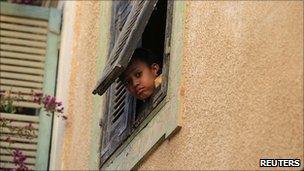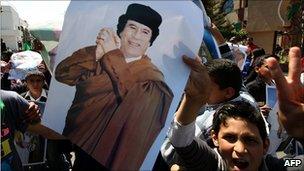Peeling back Tripoli's layers of reality
- Published

The Libyan capital does not feel like a city at war
Tripoli does not feel like a city at war. There has been no sight or sound of bombing or anti-aircraft fire for the best part of a week. Libya's capital is isolated, and the future is uncertain.
It takes most of a day to get to the nearest functioning airport, on Djerba, a holiday island in Tunisia. But in Tripoli the traffic is moving and the shops are open.
A month ago the noises coming from the Gaddafi regime were defiant. Now they are also confident, despite the continuing air attacks, and the trade and financial sanctions that Libya faces.
Government officials as well as figures connected with Colonel Gaddafi appear to feel that time is on their side. Nato, their logic seems to be, has done what it can within its UN mandate - and the regime has ridden out the storm.
One official said the Libyan government had men who had not been called up to fight yet, in the army's national reserve and in tribal forces. He said too that western countries had underestimated Col Gaddafi's support.
Crowds of chanting Gaddafi followers materialise when a television camera is produced in Tripoli. At quieter times though a more sophisticated narrative is coming out of regime officials.
'Constitution nearly finished'
The official spokesman here in Tripoli, Moussa Ibrahim, told me that "the armed uprising has stolen Libya's democratic future".
Mr Ibrahim, and others, argue that in February when the uprising began Libya was on the way to reform.
The drafting of a constitution, protecting basic rights, was nearly finished. Saif al-Islam, Colonel Gaddafi's son, was pushing for media freedom and was trying to encourage the growth of a civil society.
They recall the politicians who visited from abroad, like Tony Blair and Silvio Berlusconi, and the business deals that were done, and the close collaboration between Libya and Western intelligence agencies against violent jihadist movements.
"If Gaddafi was so bad" one official asked, "why were you all here a few months ago?"
There is still surprise and bemusement in Libya's elite that the country's transformation from pariah to friend of the West has been interrupted so decisively - and that it has gone back to being a pariah so quickly.
Peeling back the layers of reality in Tripoli is not easy.
It is true that there was a lot of talk of reform, though it was still more about words than deeds and results.
The man in charge of drafting a new constitution was produced for the foreign media the other night.
He talked about how the job was nearly done, and how in their four years of work they had been influenced by the US constitution.
Police state
Unfortunately, he explained, after the uprising started, some members of the drafting team joined the rebels in Benghazi, a crucial meetings had to be postponed.

Pro-Gaddafi demonstrations in Tripoli are common
When asked whether an uprising might have been headed off had they moved faster, he shrugged that the future wasn't predictable.
At the same time that officials talk of thwarted reforms, it is also clear that the police state here in Tripoli is as powerful as ever.
The other day we went out to record a piece to camera about 300 yards outside the gates of the hotel where most of the international press are staying. Even though we had an official minder, a car carrying two security policemen pulled up almost immediately to see what we were doing.
Then, just before the recording, a passerby stopped to talk. He was interrogated for around five minutes, not in a friendly way, by two uniformed police, two plainclothes security policemen, and our minder. The man was released, but it was a fierce response to a quick hello.
Before the bombing started, when the anti-regime demonstrations had not yet been crushed, it was possible sometimes to get away from government supervision to talk to people.
So we know that there is real opposition to Col Gaddafi in Tripoli - just as his regime also has real loyalty. It is not possible to judge how many oppose him - and how many support him.
The demonstrations for the regime are noisy but not big, considering the size of the city.
Those against don't demonstrate anymore. Last Friday there was an efficient looking roadblock cutting off access to Tajoura, in Tripoli's suburbs.
In February and March it was a hotbed of opposition activity. I was able to get there then, and saw convincing proof that demonstrators had been killed by the security forces. But on this trip, passing the Tajoura turn-off is the closest I've been able to get to the area.
Two more vignettes about Tripoli.
One man declared to me at a pro-Gaddafi demonstration that he would die if he had to for the leader he loved. Then he wanted a private word.
Was he going to say something different? Saying one thing to the camera and another when it goes away is quite common in authoritarian states. But instead he leaned closer, and confided quietly that when he said he would die for his leader, he meant it.
The same day a man waiting in a traffic jam next to the press minibus wound down his window.
"Don't believe anything," he said. And without another word, drove off.